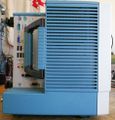TDS5034: Difference between revisions
No edit summary |
No edit summary |
||
| Line 4: | Line 4: | ||
image= Tek tds5034b 1.jpg | | image= Tek tds5034b 1.jpg | | ||
caption=Tektronix TDS5034 | | caption=Tektronix TDS5034 | | ||
introduced= | introduced=2004 | | ||
discontinued=(?) | | discontinued=(?) | | ||
manuals= | manuals= | ||
Revision as of 15:17, 15 June 2019
The Tektronix TDS5034 is a four-channel, 350 MHz, 5 GS/s digital phosphor oscilloscope with a 10.4 in. LCD active-matrix color display. This series of scopes combines 100,000 wfms/s continuous waveform capture rate and real-time intensity grading. An optional touch screen was available for all models but was standard on the TDS5054B and TDS5104B. The operating system is Windows 2000.
Besides the channel inputs, the AUX IN (auxiliary trigger), and Floppy drive, the left side panel has two USB ports, two PS-2 ports (keyboard, mouse), two VGA connectors, one parallel port, GPIB, Ethernet (RJ-45), RS-232 interface, line out, line in, and microphone in, and a CD-ROM drive (Opt 16 replaces it with a CD-RW drive). The rear panel has an EXT REF (time base reference) input, and AUX OUT (auxiliary trigger pulse output).
Applications modes available are FastAcq Acquisition (optimizes the instrument for analysis of dynamic signals and capture of infrequent events), Sample, Peak Detect (captures narrow glitches <1 ns at all real-time sample rates), Averaging (from 2 to 10,000 waveforms included in average), Envelope (from 2 to 10,000 waveforms included in min-max envelope), Hi-Res (real-time boxcar averaging reduces random noise and increases resolution), Waveform Database (accumulates a waveform database that provides a three-dimensional array of amplitude, time, and counts), and FastFrame Acquisition (acquisition memory divided into segments, maximum trigger rate >100,000 waveforms per second).
There are many options for signal acquisition, measurement, and analysis. The Overview section of the user manual is a great place to become familiar with the many functions available in the use of this sophisticated instrument.
Key Specifications
| Bandwidth and Channels | 350 MHz; bandwidth limit switchable between 20 MHz and 150 MHz; 4 channels |
|---|---|
| Vertical Sensitivity | 1 mV to 10 V/div (1 MΩ), 1 mV to 1 V/div (50 Ω) |
| Time Base Range | 200 ps to 40 s/div, 200 ps to 1000 s/div (B series) |
| Sample Rate (Max) | 5 GS/s on 1 channel, 2.5 GS/s on 2 channels, 1.25 GS/s on 3-4 channels |
| Max Record Length per channel |
|
| Max Record Length per channel (B series) |
|
| Waveform Measurements | Arithmetic: add, subtract, multiply, and divide waveforms;, Fast Fourier Transform (FFT): Magnitude; Vertical Units: Magnitude, Linear, dB, dBm; Window Functions: Rectangular, Hamming, Hanning, Kaiser-Bessel, Blackman-Harris, Gaussian, Flattop2, Tek Exponential; OPTIONAL Math: Algebraic Expressions: Extensive algebraic expressions including waveforms, scalars, and results of parametric measurements; Calculus: Integrate, differentiate; Frequency Domain Functions: Spectral magnitude and phase, real and imaginary spectra; Additional Vertical Units: Phase, degrees, radians |
| Probes | Four P5050 500 MHz ×10 probes, BNC connector with a readout pin |
| Power | 100 − 240 VAC, 47 − 63 Hz, CAT II, <220 W |







